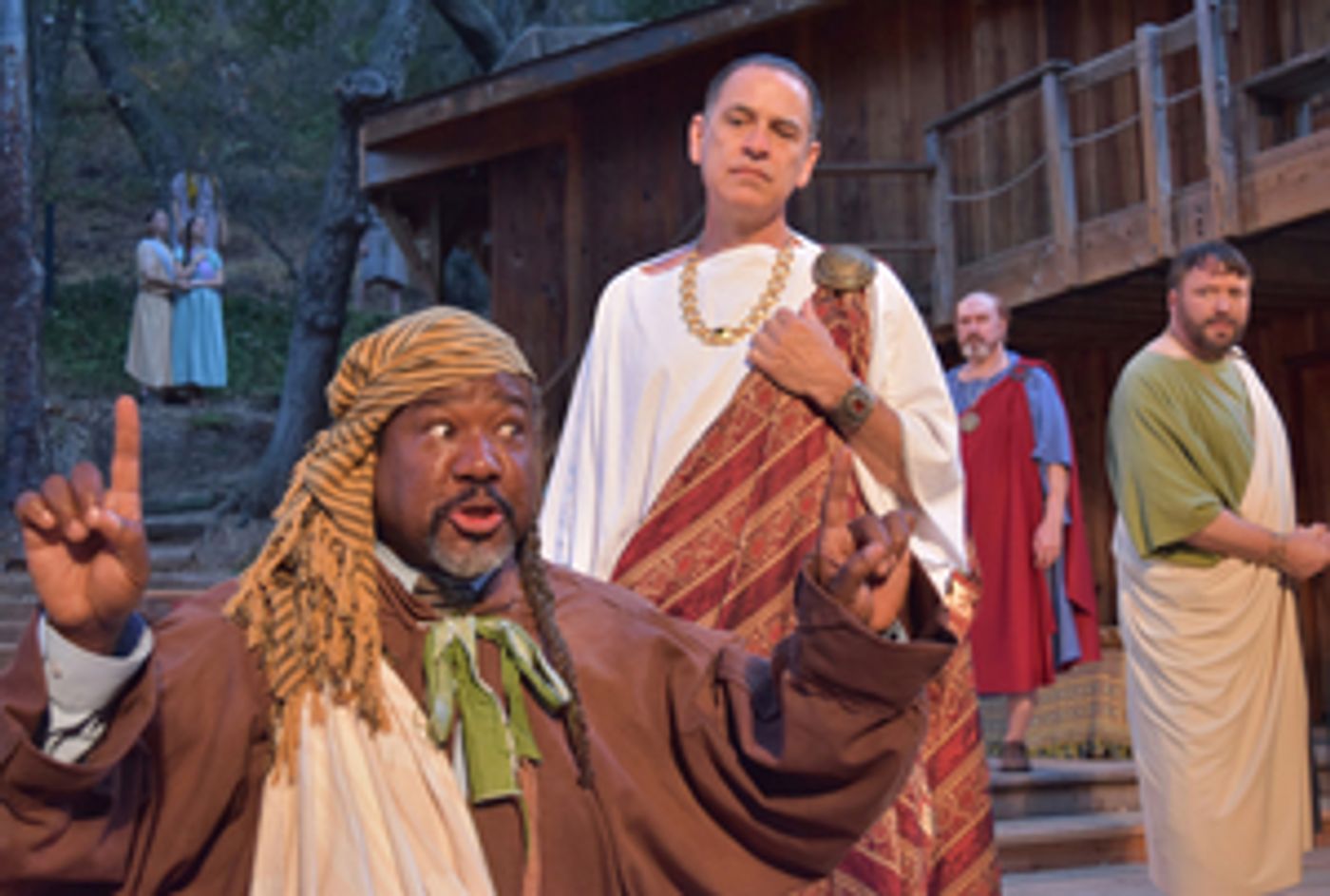Review: Compact JULIUS CAESAR Comes Up Short at Will Geer's Theatricum Botanicum
Shakespeare's political tragedy runs through October 30

Not long before he meets his maker via the business end of several daggers, the doomed hero of Shakespeare's Julius Caesar casts an eye on Caius Cassius and declares himself distrustful of that future conspirator's "lean and hungry look." "He thinks too much: such men are dangerous," Caesar tells Mark Antony. "Would he were fatter!"
Caesar's oft-quoted descriptor is an apt metaphor for the season-opening production of JULIUS CAESAR at the Will Geer Theatricum Botanicum, and not always in a good way. Lean, this production most certainly is, boiling the plot of Shakesepare's tragedy to its essentials and bringing the curtain down at an economical and intermission-free 80 minutes. Whether streamlined drama and reduced opportunities for mingling are the mandate for the Theatricum's return to live performance in 2021 (the company's Midsummer Night's Dream also runs 80 minutes) or whether this is just a happy coincidence is not for me to conjecture. The leanness box is dutifully checked, but director Ellen Geer's production could certainly be hungrier and more thought out.
Geer's program notes speak in general terms about the preservation of democracy and the dangers of "inequality, dictatorship, skewed ambition within politics." Well and good, and Geer has chosen an appropriate vehiocle to explore these themes (although productions of Caesar have enjoyed considerably more resonance with American audiences during the previous four years than since a new tenant took up residence at 1600 Pennsylvania Avenue.) In Geer's production, the Theatricum actors are in period costumes and there's nothing much going on visually or production-wise to give the ideas a larger resonance. So we're left with Shakespeare's words and our own frames of reference to make any broader connections. Well and good, again.
Except we're not. The production employs a narrator in the person of company regular Gerald Rivers who welcomes us into the theater and steps briefly into the action as the Soothsayer who warns Caesar to "beware the Ides of March" (spoiler alert: J.C. doesn't listen). Rivers then spends a lot of unnecessary time talking about the haves and the have-nots, informing us that a storm is brewing and generally underlining the messages of the play that the production is either too ill-equipped or too lazy to do on its own. Not only is Rivers' narration a thankless task, it disrupts what little dramatic momentum the production is able to generate.
Which isn't much. Sturm and Drang and fever-pitch emotion are the orders of the day whether from Melora Marshall's Cassius, Willow Geer's Portia and certainly Michael McFall's Antony whose amped up promise over Caesar's corpse to "let slip the dogs of war" is so impassioned that you wonder whether he'll have anything left for the tide-turning "lend me your ears" speech to the masses one scene later.
In Christopher W. Jones's performance, Marcus Brutus is suitably pensive, conflicted and torn between his love for a friend and the supposed greater needs of his nation. The friction generated between Jones and Marshall is present and effective. In the relatively brief stage time he is given Mark Lewis delivers a Caesar who is slick and quietly self-adoring, a warrior/politician who can inspire adoration or hatred in his populous. Lewis is a tall man and Geer goes for elevation, during the skilful renderings of Caesar's near-coronation (placing him atop a roof) and in the moments before his assassination.
Hearing Shakespeare's words and seeing this tale rendered again - and live! - is a very good thing, and this is one of the city's premiere venues to see it unfold. With its bucolic hillside location and its loyal, all-ages fan base, the Theatricum Botanicum is a place where magic happens every night of every production. Crowds, soldiers or apparitions can emerge from every nook, every tree of that magnificent Topanga Canyon glen. When a play calls for thunder and lightning, tempests or mayhem, designers Marshall McDaniel, Grant Escandon and Zachary Moore make it happen. Throngs? Battles? Theatricum productions usually have them in abundant supply.
But with these resources at the ready, the company couldn't deliver on Antony's tide-turning Act III address to the citizens of Rome. That sandbagging soldier, it will be remembered, professes to having "neither with, nor words, nor worth...nor the power of speech,/To stir men's blood." In fact, he has all of these things and McFall is anxious to put these rhetorical tools to use. But he could use some help. On our way into the theater, audience members are given a slip of paper with some suggestions of exhortations to shout out during key crowd scenes. The opening night audience, at least, might have benefited from some prompting to help turn us into the "cruel men of Rome" that the play calls for.
Not surprisingly, it was a full house. After so many months of being limited to streamed productions, audiences are back and we are hungry. It is unfortunate that the meal delivered by the Theatricum's Julius Caesar falls several courses short of delivering a banquet.
Photo by Ian Flanders
Reader Reviews
Videos

